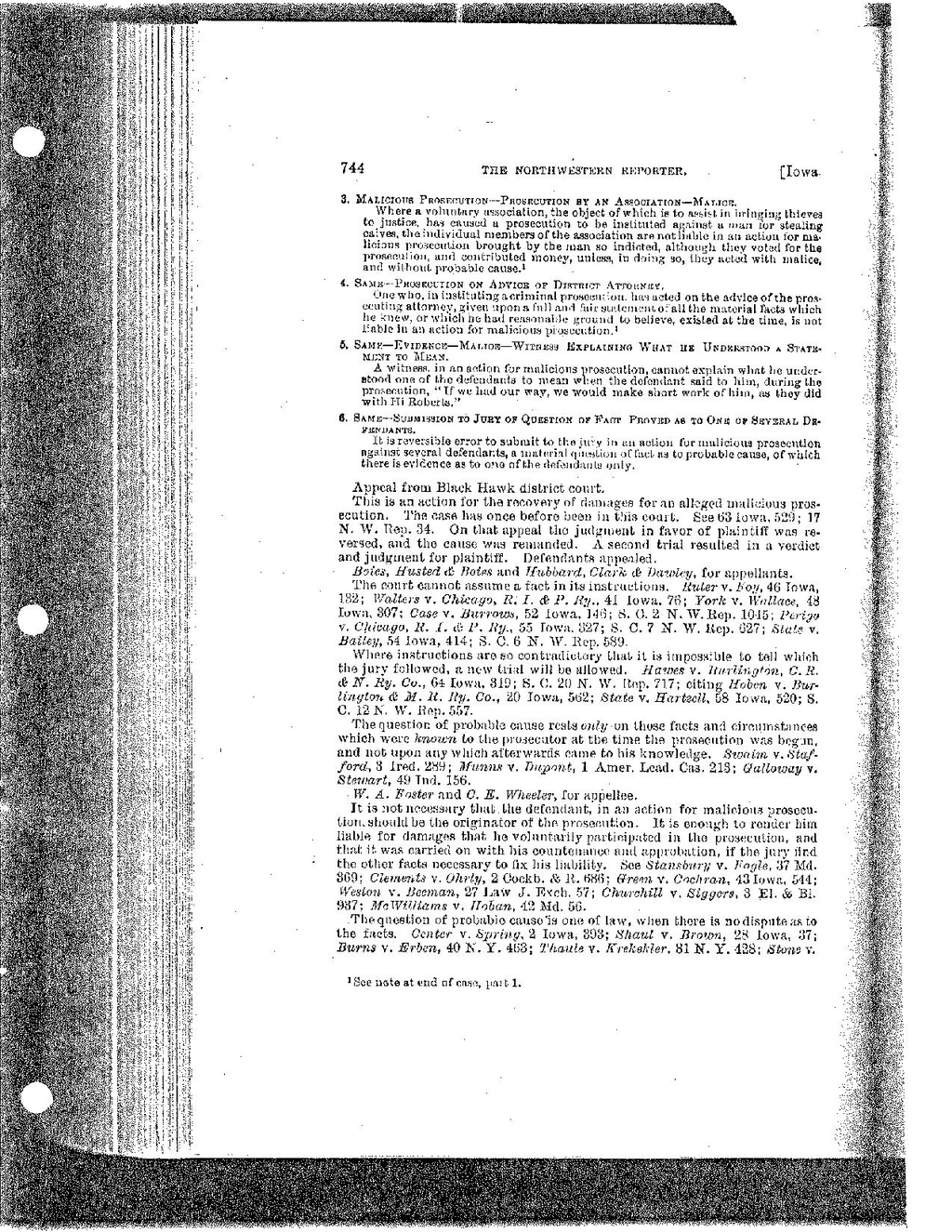3. Malicious ProsecutionProsecution by an AssociationMalice.
Where a voluntary association, the object of which is to assist in bringing thieves to justice, has caused a prosecution to be instituted against a man for stealing calves, the individual members of the association are not liable in an action for malicious prosecution brought by the man so indicted, although they voted for the prosecution, and contributed money, unless, in doing so, they acted with malice, and without probable cause.[1]
4. SameProsecution on Advice of District Attorney
One who, in instituting a criminal prosecution, has acted on the advice of the prosecuting attorney, given upon a full and fair statement of all the material facts which he knew, or which he had reasonable ground to believe, existed at the time, is not liable in an action for malicious prosecution.[1]
5. SameEvidenceMaliceWitness Explaining What he Understood a Statement to Mean.
A witness, in an action for malicious prosecution, cannot explain what he understood one of the defendants to mean when the defendant said to him, during the prosecution, "If we had our way, we would make short work of him, as they did with Hi Roberts."
6. SameSubmission to Jury of Question of Fact Proved as to One of Several Defendants.
It is reversible error to submit to the jury in an action for malicious prosecution against several defendants, a material question of fact as to probable cause, of which there is evidence as to one of the defendants only.
Appeal from Black Hawk district court.
This is an action for the recovery of damages for an alleged malicious prosecution. The case has once before been in this court. See 63 Iowa, 529; 17 N. W. Rep. 34. On that appeal the judgment in favor of plaintiff was reversed, and the cause was remanded. A second trial resulted in a verdict and judgment for plaintiff. Defendants appealed.
Boies, Husted & Boies and Hubbard, Clark & Dawley, for appellants.
The court cannot assume a fact in its instructions. Ruler v. Boy, 46 Iowa, 182: Walters v. Chicago, R. I. & P. Ry., 41 Iowa, 76; York v. Wallace, 48 Iowa, 307; Case v. Burrows, 52 Iowa, 146; S. C. 2 N. W. Rep. 1045; Perigo v. Chicago, R. I. & P. Ry., 55 Iowa, 327; S. C. 7 N. W. Rep. 627; State v. Bailey, 54 Iowa, 414; S. C. 6 N. W. Rep. 589.
Where instructions are so contradictory that it is impossible to tell which the jury followed, a new trial will he allowed. Hawes v. Harrington, C. R. & N. Ry. Co., 64 Iowa, 319; S. C. 20 N. W. Rep. 717; citing Hoben, v. Burlington & M. R. Ry. Co., 20 Iowa, 562; State v. Hartzell, 58 Iowa, 520; S. C. 12 N. W. Rep. 557.
The question of probable cause rests only on those facts and circumstances which were known to the prosecutor at the time the prosecution was begun, and not upon any which afterwards came to his knowledge. Swaim v. Stafford, 3 Ired. 289; Munns v. Dupont, 1 Amer. Lead. Cas. 213; Galloway v. Stewart, 49 Ind. 156.
W. A. Foster and C. E. Wheeler, for appellee.
It is not necessary that the defendant, in an action for malicious prosecution should be the originator of the prosecution. It is enough to render him liable for damages that he voluntarily participated in the prosecution, and that it was carried on with his countenance and approbation, if the jury find the other facts necessary to fix his liability. See Stansbury v. Fogle, 37 Md. 369; Clements v. Ohrly, 2 Cockb. & R. 686; Green v. Cochran, 43 Iowa, 544; Weston v. Beeman, 27 Law J. Exch. 57; Churchill v. Siggors, 3 El. & Bl. 937; McWilliams v. Hoban, 42 Md. 56.
The question of probable cause is one of law, when there is no dispute as to the facts. Center v. Spring, 2 Iowa, 393; Shaul v. Brown, 28 Iowa, 37; Burns v. Erben, 40 N. Y. 463; Thaule v. Krekskler, 81 N. Y. 428; Stone v.

